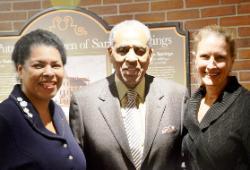This section of the SUNY Empire website is no longer being updated.
View current SUNY Empire Stories.
October 18, 2015
Chairman McCall Keynotes SUNY ACT Meeting

SUNY Board of Trustees Chairman H. Carl McCall was the keynote speaker at the recent meeting of the Association of Council Members and College Trustees of The State University of New York.
Current ACT President G. Angela Henry, who also is a member of the Empire State College Council, introduced the chairman to the audience, which included many ACT members, campus and SUNY system senior staff and several campus presidents.
SUNY Empire State College President Merodie A. Hancock and Empire State College Council member Anthony Esposito joined Henry in representing the college.
They heard McCall discuss important SUNY-wide priorities for the 2016, including increasing diversity among campus presidents, staff, faculty and the student body, which, he said, must be reflective of the state of New York.
The chairman remarked that SUNY has done a very good job of attracting a more diverse population of students, but that improvement is needed among top SUNY leadership positions.
McCall expressed particular concern about SUNY’s ability to meet the needs of students who identify as Latino. Recently, the state’s Latino population has increased far more rapidly than all other ethnic populations, a trend the chairman said he expects will continue well into the future.
A new and improved version of the NYSUNY2020 legislation was the other priority discussed by McCall.
Signed into law by Gov. Andrew Cuomo in August 2011, the five-year program provided matching funds for new campus initiatives, which were awarded on a competitive basis and, in a first for SUNY, a five-year tuition plan and associated commitment by the state for consistent financial support.
McCall lauded SUNY2020 for enabling the campuses to hire new faculty with the increased revenue generated by affordable annual tuition increases and for providing predictability in cost, which made planning easier for students and parents.
However, McCall was firm in his comments that the state must increase its financial commitment to SUNY. New tuition revenue and level state support provided in the now-expired legislation, he said, were offset in no small measure by mandated cost increases brought about by contractual obligations to faculty and staff negotiated by the state.
The chairman noted his support for salary and pay increases for SUNY faculty and staff, but said that level state funding eroded the ability for campuses to hire new faculty and to strengthen existing or undertake new initiatives to support student success.
McCall concluded with a question-and-answer session, which touched on advocacy for SUNY with the state legislature in the context of budget priorities and many of the ongoing, successful efforts to enhance diversity across the 64-campus system.
McCall’s remarks were delivered at dinner Friday evening, Oct. 16. The weekend-long meeting was held at the Gideon Putman Hotel, Saratoga Springs, N.Y.
SUNY Chancellor Nancy L. Zimpher spoke on Saturday morning. The ACT meeting included panel discussions and other sessions designed to help ACT members improve their skills and effectiveness in their roles for the selection of new presidents, as advocates for SUNY campuses at the local and state levels and as advisors and supporters for their campus presidents.